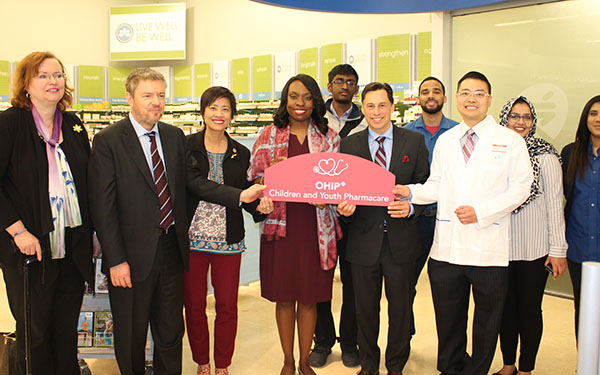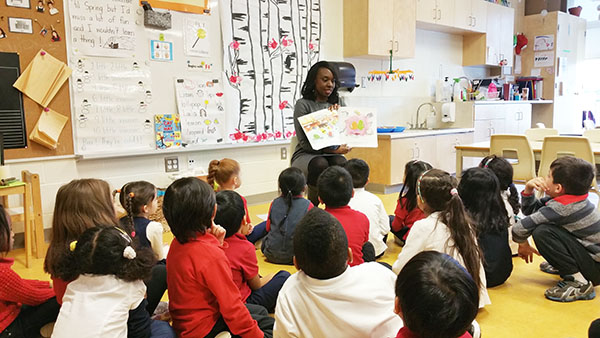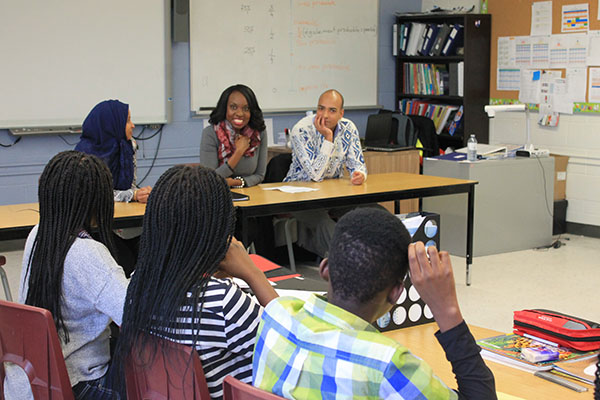By Neil Armstrong
PRIDE Contributing Writer
TORONTO, Ontario May 29, 2017 (PRIDE) — Ontario’s Education Minister, Mitzie Hunter, says the new OHIP+: Children and Youth Pharmacare Program, which starts in January 2018, is one of the most exciting aspects of the recently announced provincial budget.
In a recent exclusive interview with Pride News Magazine, she underscored that this is the first balanced budget since the global recession, and that Ontario is the first province in Canada to step forward with universal Pharmacare for everyone under the age of 25.
Youth and students will be able to go to a pharmacy, present a prescription, and receive medication at no cost.
“This is an incredible transformative program, and it really demonstrates that our government is investing in people and ensuring that we invest in the health of our people,” the Minister noted.
This is part of $7billion, in three years, that the government is investing to help in many aspects of healthcare, including universal Pharmacare, she added.
Minister Hunter said some of the other areas in healthcare that the government is investing in, include a greater focus on patient care, reducing wait times, and improving access to care, including home care and community care.
She said she knows that home and community care are very important “for our community, both from an employment perspective, and also for those who may have aging parents or seniors, who needed that additional help and support — maybe someone with a disability that needs that support.”
The government is also expanding University Health Network’s inherited metabolic disorders and red blood cell disorders clinics, which will improve access to care and treatment for patients with disorders such as sickle cell disease.
The clinics will also help to improve the transition of 172 patients from paediatric to adult care, from SickKids to the University Health Network.

Education Minister Hunter (in burgundy dress) seen at a local drug store, during a recent announcement of the Pharmacare Program.
The new Ontario Student Assistance Program (OSAP) that offers free tuition for more than 210,000 students, in postsecondary education, starts in the fall.
“There is no age limit as well to this, so students can apply. They just have to go on Ontario.ca/OSAP, and one of the things that we wanted to ensure, as a government, was that we removed barriers to postsecondary education. We didn’t want anyone that felt they couldn’t afford it, to not have an opportunity to access postsecondary.”
The minister said this is about creating more access for more people, to pursue postsecondary education.
In the budget, the government notes that it is taking action on improving students’ cognitive, emotional, social and physical development, with programs and services focusing on their wellbeing and mental health.
Minister Hunter said as part of this, over the next three years, the government is investing an additional $49million to promote and to support the wellbeing of Ontario students.
“This move forward will transform our education system. We’re going to be working with our education partners, because we know that there are many good practices out there in our school boards. So, we want to build on that and we want to ensure that this is integrated across our education system.”
She wants to ensure that schools are places of wellbeing and places that “really look at that whole student, whether it’s physical, cognitive, emotional and social.”
The education minister said the investment in wellbeing would ensure that this happens for students, as well as for the staff at schools.
“We are also investing in mental health to ensure that there is more support for people with mental health… across the board, regardless of age. There’s more investment within the budget that speaks to that as well.”
The budget also indicates that the province is constructing new schools and renewing existing ones. However, some residents in the province are concerned about schools closing in their communities.
Minister Hunter said the government has invested a significant amount in the rebuilding of schools and in building new schools in the province.
“We’ve actually built 110 new schools and significantly expanded or renovated 780 schools, so we have committed to continuing to have infrastructure investments in our schools. And, when there is a need for a school board to look at, maybe consolidating a school, then they would need to consult with the community before that is done and put forward a proposal and a recommendation to the board.”
She said these are very tough decisions for the school boards to make, and she knows that the conversations about a change to a school or consolidation of a school are difficult for the community, parents, and students.
“But the school board is required to have a consultation process to get meaningful input from the community, before that decision is made,” she said, noting that there is $1.2billion in the budget for school renewal.
Dr. Carl James, Jean Augustine Chair of Education, Community & Diaspora at York University, principal investigator, and Tana Turner, co-investigator, recently released the report, “Towards Race Equity in Education: The Schooling of Black Students in the Greater Toronto Area,” done in collaboration with the African Canadian Legal Clinic (ACLC) and the Ontario Alliance of Black School Educators (OABSE).
There are several recommendations in the report for the Ministry of Education.

Education Minister Hunter says she tries to visit one Ontario school a week. Here she is seen leading students in a reading exercise.
“That is a goal and objective that I share. I want, and my priority is, that all students in Ontario receive an excellent education and, under no circumstances, are issues of racism, discrimination to be tolerated in our education system.
“We want all of our students to see themselves reflected in our school system, in the curriculum, in the learning environment; we want them to have a sense of wellbeing and belonging. We want to have high expectations of all of our students, including our black students and racialized students, so this is very important,” she declared, passionately.
Hunter said black youth face disparities in many aspects of their lives and this is something that was brought forward in Dr. James’ report.
“We have to work to eliminate those barriers as it relate to the education system. We are ensuring that this is something that we’re paying very close attention to, and in ensuring that all students have access to the best education possible.”
Regarding the York Region District School Board (YRDSB), Minister Hunter said she is very pleased to see that the board is moving forward with implementing the 22 recommendations that she has provided to them.
“These recommendations have a timeline that the board needs to follow and be responsive to. So now that there is an interim executive director, that’s obviously going to be very helpful to the board in implementing these directives. It’s very important to me that the students of York Region have the best opportunity for an education, that when they go to school they are in an environment that’s safe, that’s welcoming, where they feel that they belong, and that when there are issues that arise, that we don’t shy away from those issues.”
The review of the YRDSB that was done by Patrick Case and Suzanne Herbert indicated that the board needed to strengthen its equity and inclusive education policies, and its leadership and governance.
“My 22 directives are really meant to set them on a path to do that. My belief is that when students come to school that they need to be in an environment that allows them to be at their best and allows them to grow, to learn, and to be supported. And if that is not happening I’m very concerned about that because I want all students in Ontario to have the best opportunity for an excellent education,” the Minister stated.
Hunter said, as an immigrant to Canada, she has had more doors open to her as a result of the education that she received here.
“My parents always focused on, we’re here in Canada so you can have a better life and the way to do that is through education, so it was always something that was very much reinforced. And I don’t want to see any student, any young person not have that opportunity.”
She believes that Ontario has one of the best education systems in the world.
“I see our education system from a very wonderful perspective. My goal is to get into one school each week,” revealed the minister, who was speaking to Pride News Magazine, shortly after visiting John Polanyi Collegiate Institute in Lawrence Heights on a Friday afternoon.
“I see how our teachers, our school leaders, and our educators are working, each and every day, on behalf of students. And I see the brilliance of our students and the fact that they striving to do their best, so that is the kind of environment and the kind of culture that I want to see in our schools – one that supports our young people so they could be their best.”
Recently, Hunter announced that Ontario’s 2016 graduation rates have reached a historic high – 86.5 % of high school students are graduating within five years – something she describes as a “remarkable achievement.”
This is up more than 18 percentage points compared to the 2004 rate of 68 percent. The number of students graduating in four years continues to grow and is now 79.6% — an increase of more than 23 percentage points since 2004.
“It’s due to the hard work of all of our students and their parents and also the great education workers that we have, all of our teachers, our education assistants, even our secretaries, and those who keep our school humming, those custodians
that keep it a place of wellbeing and just keep everything functioning,” she intoned.
She also referenced all of the of the school leaders – principals and vice principals.
Hunter said she visited a school in Oshawa, earlier this month, and it was remarkable how that team was focused on students, their wellbeing, and their achievement.
“What that school principal and vice principal said to me, as well as the school achievement officers, they said that they work to know the names and what is happening to every student in their school. I was very proud to be in that school, to see the efforts that everyone was making so that Ontario students get the best education.”
Minister Hunter said the government, in this budget, is investing $23.8billion in Ontario’s education system and this is an increase, over last year, of $849million.
Much of this is being invested in areas that the government still wants to see further improvements.
“Much of that is being invested in special education, students at risk, and in areas that we want to see our schools improve even further,” she said, noting that, “I know that we’re preparing the next generation in the best possible way that they have the skills that they need to move on to pathways in life.”
The government also launched the new Career Kick-Start Strategy as part of the budget; $190million, which is looking at students getting their first jobs.
“We know that experiential learning is important for students, so we will be ensuring that, through this investment — Career Kick-Start — that we’re creating 40,000 opportunities for students through experiential learning and for them to get that first line on their resume with their first job. So that they can hit the ground running when they graduate, and really have that very important experience on their resume,” she added.
Minister Hunter said part of her mandate letter from Premier Kathleen Wynne, when she was appointed minister of education, is to implement identity-based data.
Her ministry will be working with the Anti-Racism Directorate to set up this data collection.
“We’re working, of course, with York University and the work that Dr. Carl James has been doing there, to help inform what we’re doing. The data will show us an accurate picture of how each student is doing,” she revealed.
Asked about strategies to help Somali youth, especially boys, Minister Hunter said the Somali community and Somali students have worked really hard to improve their graduation rates and to improve their outcomes for their community.
“And that’s actually a good example for us to look towards for other students who might still be struggling. So we are making sure that students get the supports that they need.”
She said one of the areas, from a policy perspective, the education ministry is focused on, is math, because it wants to make sure that students are receiving the numeracy skills and the math skills that they need so that they can be prepared for opportunities in the future.
“I want to encourage students to stay with math. When they’re younger math needs to be fun and engaging and they need to do well at math. And as they go to the high school years, just stay with math because that opens up many career opportunities and choices later on.
“Many jobs in the future will need math and numeracy skills. We have a renewed math strategy, we’ve invested $50million in that, and we know that the areas of applied math, in particular, need greater support, so we’re ensuring that students get the help that they need, parents also, to help support their children in their learning,” she stated.
There is Homework Help, which is an online service provided through TVO that has Ontario certified teachers able to help with math homework. There is also assistance for French language learners.
Speaking specifically about black youth, Hunter said Michael Coteau, Minister of Children and Youth Services and Minister Responsible for Anti-Racism, has launched an Ontario Youth Action Plan.
The budget has an investment of $47million, over four years, and this will increase access to supports of 10,800 black children and youth by 2019-20.
The plan looks at investments in culturally-focused parenting initiatives, and mentoring programs, encouraging black students to stay in school by investing in early intervention programs, helping black students to access higher education, through culturally-focused outreach.
“I absolutely know that our black youth can achieve and they have every potential that is there, available to them. And we want to make sure that they receive the support that they need to achieve their full potential.
“So, it’s important for our school system, for parents, and those who support our black youth, to have high expectations of their achievements and their outcomes,” Education Minister, Hunter, stressed.
 Pride News Canada's Leader In African Canadian & Caribbean News, Views & Lifestyle
Pride News Canada's Leader In African Canadian & Caribbean News, Views & Lifestyle







